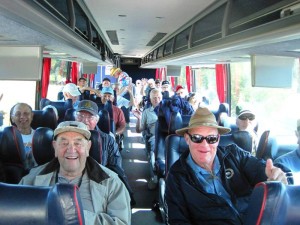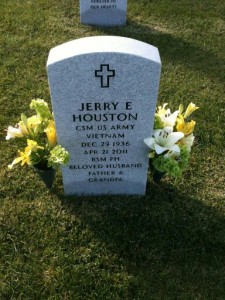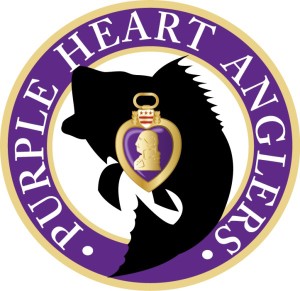Remember Your Veterans Today
For those of you who have the day off from work or aren’t in class, take some time to reflect on those who have served our country. Here’s our tribute to Veteran’s Day with this story running in the current edition of California Sportsman:
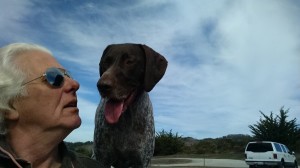
By Chris Cocoles
The ultimate goal is not about rehabilitation
but recreation.
But Randy Houston is being
too humble. His vision for creating opportunities
to take disabled veterans fishing
and hunting has accomplished more
than he will take credit for.
Houston started Purple Heart Anglers
(purpleheartanglers.org) as a nonprofit
organization intending for the simplest
of gestures to thank those wounded in
battle. Four years later, as he arranges
fishing and hunting trips all over California
(a group was funded to take a fishing
trip to Alaska last summer), it’s become a
healing place for American heroes to experience
the joy of the outdoors.
Busloads of veterans from conflicts as
recent as Afghanistan and as far back as
World War II, and from organizations like
the Veterans Home of California in Napa
County’s Yountville, head to New Melones
Reservoir and Camanche Lake to
fish, or Camanche Hills Hunting Preserve
in Ione to shoot pheasants.
“They show up and we go fish and
then eat. We eat a lot of food,” Houston
says with a laugh. “That’s become kind of
our mantra: we hunt, fish and eat, don’t
talk politics and we don’t do therapy. And
that’s just the simplicity of it.”
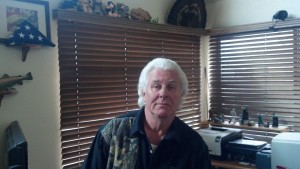
RANDY HOUSTON GREW up on the San Mateo
County coast in El Granada, south of
San Francisco, where he dreamed of being
a baseball player, not of combat. His
older brother by almost 12 years, Jerry,
wanted to be a solider and left home for
the Army when Randy was just 7.
“I never really got to know him that
well,” Randy Houston says. “When I got
older, the attitude I had about him leaving
home when I was kid had changed.
There was a time when my big brother
wasn’t around. He was a soldier and I
didn’t know what that was about when
I was a kid.”
Jerry Houston went to Vietnam and
was wounded twice starting in 1966,
once from a sniper’s gunshot and, after
going back, when a booby trap exploded.
After losing some fingers and his
body filled with shrapnel, he was awarded
two Purple Hearts and a Bronze Star
for Valor.
In 2009, then 72-year-old Jerry was
named the national Patriot of the Year by
the Military Order of the Purple Heart and
inducted into the Arizona Veterans Hall of
Fame after he’d moved there. His younger
brother attended the latter ceremony.
“I was looking at a man who was different
from the one I knew,” Randy Houston
says. “Over the years he had started
using a cane and he was becoming a little
weak. When I saw him walk into the
(building) for the ceremony there was a
taller, straighter and stronger man than
I had seen before. And I realized that he
was amongst his peers. And that’s what
he was – he was military.”
It was an eye-opening experience for
Randy, who never considered a military
career, instead following in the footsteps
of the boys’ carpenter-father, Elmer. Randy,
60 and around retirement at the
time, thought about it and called his
brother. He wanted to help Jerry’s peers,
but he had no idea where to start and no
contacts. Jerry had some answers.
The Houston’s were an outdoors-oriented
family; Randy got his first hunting
license at 9, hunting in pheasant
fields around El Granada and Half Moon
Bay, and harvested his first buck at 12.
The most logical move to do his part
for Jerry’s comrades hurt in action involved
what he knew so well: fishing
and hunting.
Purple Heart Anglers was founded
under the umbrella of the Military Order
of the Purple Heart, but a couple years
later the organization became its own
501 (c) (3) nonprofit outfit. Houston says
about 1,000 disabled veterans have participated
on various outings over the last
five years.
So impactful has this and other organizations
around the country contributed
to a better quality of life for veterans,
in 2014, Randy Houston was inducted
into the California Outdoors Hall of Fame
in a ceremony at the International Sportsmen’s
Expo in Sacramento.
Trips have included the aforementioned
Ketchikan, Alaska, fishing adventure
(money was donated to secure
airfare for a small group, plus part of the
lodging costs and fishing trip), deep-sea
excursions off the California coast, salmon
fishing in the Sacramento River and
an upcoming trout trip to Lake Tulloch.
Houston says his organization always
seeks funding from outside sources and
is always willing to listen to corporations
willing to provide sponsorship opportunities
to help with costs.
“Without the donations, it’s tough,”
Houston says.
But he’s adamant about making
sure Purple Heart Anglers is about the
veterans, not he or anyone else behind
the scenes. The only banner that currently
flies during events is the group’s
purple-themed logo featuring an outline
of a jumping fish blended with a Purple
Heart medal.
Volunteers like fishing guides and
food vendors have offered their time
to host fishing trips and feed everyone
at the end of the day. For pheasant
hunting trips at Camanche Hills, Purple
Heart Anglers supply the birds themselves,
but the fee to hunt on the land
gets waived by the owner (Houston’s
beloved German shorthaired pointer,
Pennie, “is our No. 1 pheasant hunting
volunteer”).
When this was just a fledgling idea,
Houston set up shop with a tent in
front of a Bass Pro Shops store in Manteca
and sold raffle tickets to help fund
fishing and hunting events. But many
disabled veterans shopping there also
found their way to the booth. Over
time, 500 would sign up to be a part of
the fun.
“(Bass Pro Shops) was good to me
to allow me to sit outside in my little
tent,” he says.
In those early years, Houston rarely went
on the boat or into the field with the veterans
and the volunteer fishing or hunting
guides located around Northern or Central
California who took them out. He wants to
be in the background, and even now he’ll
many times stay behind to help prepare
the usual meal lakeside or near the hunting
land when the groups return.
“My wife would ask me, ‘Why aren’t
you going?’ And I would say, ‘It’s not for
me. It’s for the guys.’ If I take a space on the
boat and I’m not taking a space of someone
else who can go, then maybe I’ll go.
It seems funny for me to be on the boat
when there’s a veteran somewhere who
could be there,” Houston says. “I’ll wave at
the dock when they leave and welcome
them back when they get home.”
And though it’s obvious this is cathartic
for those who went through such tragic
circumstances that left them wounded
in action, Purple Heart Anglers tries to
stay away from trying to reinvent the
wheel and play psychologists.
“I’m not there to fix anybody; I don’t
know how. The only thing we do is create
a space where the veterans and the
people they’ve served and protected can
get together,” Houston says. “We can say
thank you that way.”
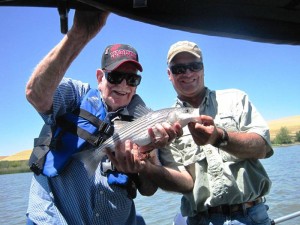
AMONG THOSE BRAVE men and women
who Purple Heart Anglers have thanked:
a 92-year-old World War II bomber pilot,
a 96-year-old who also fought in WWII
and 20-somethings who recently served
in the Middle East and came home with
combat injuries. There are Navy and Army
vets, Air Force pilots and Marines, both
men and women.
“As long as they have a disability rate
of 1 percent, that’s all we ask,” Houston
says, though an October fishing trip on
the Sacramento River included 14 active-
duty Marines.
Chats during downtime and meals
don’t always bring up stories about how
the vets suffered their wounds. But occasionally,
the subject comes up. In Alaska, a small group of four veterans was sitting
at the dinner table literally swapping war
stories. At one point, Houston had the
sensation of square peg in a round hole.
“Wait a minute: I don’t belong in this
conversation. I don’t know; I never was
there and I don’t understand,” he says. “It’s
like if you never jumped off the bridge
you don’t know what it’s like to hit the
water. I’ve excused myself from conversations
because of that. They open up
because they feel comfortable in that environment
with each other.”
Houston and some of the men and
women have talked about their experiences
– the soldier in a Humvee talking to
a colleague, and minutes later that friend
is no longer there.
What overwhelms Houston is that
when the day of fishing for bass at New
Melones or hunting upland birds in a
Central Valley field is completed, the
wounded warriors go home to their lives
and families and try to carry on the best
they can.
“That’s why (post-traumatic stress disorder)
is such an important issue. Those
in Vietnam came back with it; those in
World War II came back with it. We had a
young guy who was blown up 12 times,
and they didn’t let him go back,” Houston
says. “And he was angry. His friends were
still there doing what he was supposed to
be doing.”
But an impact, small or not, is being
made. During many events, Houston will
sit in a corner and relax after a successful
outing. But periodically one of the veterans
will walk over to him.
“They say to me that I’ve changed
their lives. I’m thinking, ‘How serious can
that be?” he says with a laugh, knowing
his intentions are just to be a small relief
among a far more complicated picture
considering what they’ve been through.
“It becomes way overwhelming.”
One disabled vet who once tried to
commit suicide now volunteers to help
cook up lunch after his peers go fishing
or hunting. The program has affected
many lives for the better. Houston and
his volunteers are not miracle workers,
just people who like to be outside
and want to share the experiences with
those who are trying to put their lives
as well as their bodies back together.
And having a sense of humor can go a
long way to cope with some unimaginable
tragedy.
“We did a fishing trip out of Brannan
Island (Rio Vista on the Sacramento River)
with some disabled vets. One of the old
guys from Yountville hooks a fish and
starts to reel it in. And about two-thirds
of the way in he starts to run out of gas,”
Houston says.
“And he’s in his 80s. At that particular
moment any good fishing buddy will
start giving him a hard time, which I did.
I said, ‘You act like an old man out here.’
He finally gets it in and says, ‘Oh, that was
hard.’ And he says, ‘I can’t help it. I just had
a stroke three months ago.’ We’re laughing
and he’s laughing. I almost fell out of
the boat. We’re all laughing hysterically
and he’s having a great day of fishing.”
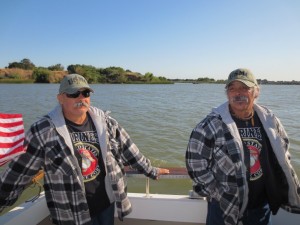
JERRY HOUSTON, WHO was also exposed
to Agent Orange during his tour of duty,
passed away at 75 on April 21, 2011. One
trait his little brother admired about Jerry
was the honor and pride he took and
protecting and serving, whether it was
his country or family.
“It’s funny, I’ve discovered my brother
had a lot of other brothers when you’re
talking about the military brotherhood,”
Houston says.
Jerry was a man of few words while
managing to say a lot with his actions. His
widow has told her brother-in-law many
times how proud Jerry was of his baby
brother for being so gracious to fellow
wounded warriors.
Randy has learned more about his
brother since he passed from getting to
know so many others who were like Jerry:
the ones who suffered on battlefields
thousands of miles from home.
“When he was still alive, the program
was becoming more active. I’d call him
and say, ‘Hey, this is what we’re doing.’
And in his simplicity it was, ‘Yeah, proud
of ya, boy.’ He was not a rah-rah cheerleader.
It would bring me back down
where I belong. He had a way to put
things in perspective for me.”
Purple Heart Anglers takes the approach
not to magically heal and repair,
but to just do what they can to create a
few smiles.
“It’s not hard not to stay engaged in
this program. I had a man in a wheelchair
who was 6-foot-4, 250 pounds, was
paralyzed by a gunshot and in a chair for
eight years. The first thing he was telling
me was to thank me for what I’m doing,”
Houston says.
“He had it backwards. What it does
show me is those people appreciate
what we’re doing as an organization. It
means something to them that we care.
You know, I’m a rather egotistical guy
and always have been. But this has kind
of put me on my knees. I have been completely
humbled by the participants. I’ve
seen legs missing, limbs missing, blindness,
deafness. They’ve gone through
things I couldn’t even have imagined.
And they’re coming out and having a
good day. How can you not participate
in this?”
Editor’s note: To contact Purple Heart Anglers
to donate or for more information,
email Randy Houston at randy@purpleheartanglers.
org. Write them at Purple
Heart Anglers, PO Box 1621, El Granada
CA 94018. You can also find them on
Facebook (facebook.com/pages/Purple-
Heart-Anglers/120269434661712).
